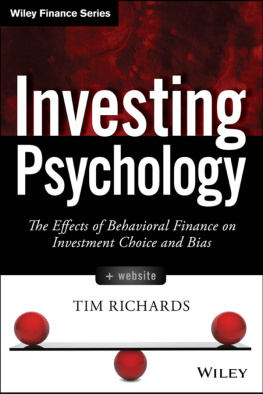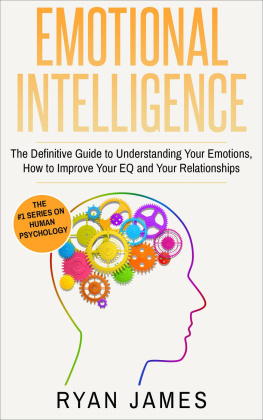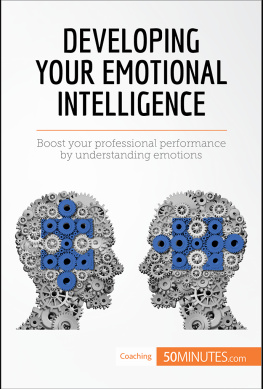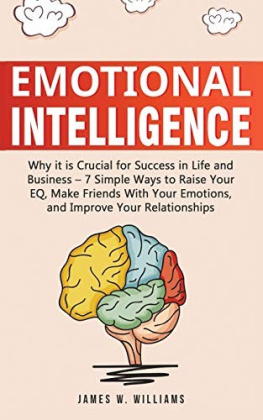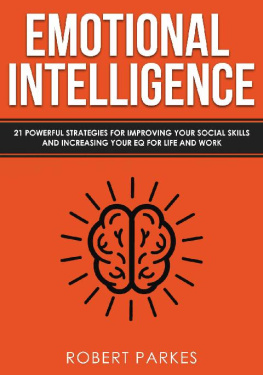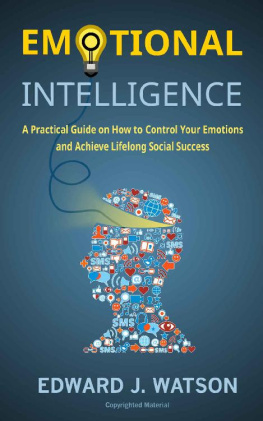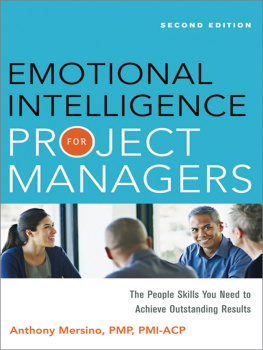Richards - Emotional intelligence : how to increase EQ, interpersonal skills, communication skills and achieve success
Here you can read online Richards - Emotional intelligence : how to increase EQ, interpersonal skills, communication skills and achieve success full text of the book (entire story) in english for free. Download pdf and epub, get meaning, cover and reviews about this ebook. year: 2015, publisher: CreateSpace Independent Publishing Platform, genre: Religion. Description of the work, (preface) as well as reviews are available. Best literature library LitArk.com created for fans of good reading and offers a wide selection of genres:
Romance novel
Science fiction
Adventure
Detective
Science
History
Home and family
Prose
Art
Politics
Computer
Non-fiction
Religion
Business
Children
Humor
Choose a favorite category and find really read worthwhile books. Enjoy immersion in the world of imagination, feel the emotions of the characters or learn something new for yourself, make an fascinating discovery.

Emotional intelligence : how to increase EQ, interpersonal skills, communication skills and achieve success: summary, description and annotation
We offer to read an annotation, description, summary or preface (depends on what the author of the book "Emotional intelligence : how to increase EQ, interpersonal skills, communication skills and achieve success" wrote himself). If you haven't found the necessary information about the book — write in the comments, we will try to find it.
Richards: author's other books
Who wrote Emotional intelligence : how to increase EQ, interpersonal skills, communication skills and achieve success? Find out the surname, the name of the author of the book and a list of all author's works by series.
Emotional intelligence : how to increase EQ, interpersonal skills, communication skills and achieve success — read online for free the complete book (whole text) full work
Below is the text of the book, divided by pages. System saving the place of the last page read, allows you to conveniently read the book "Emotional intelligence : how to increase EQ, interpersonal skills, communication skills and achieve success" online for free, without having to search again every time where you left off. Put a bookmark, and you can go to the page where you finished reading at any time.
Font size:
Interval:
Bookmark:
EmotionalIntelligence
How toIncrease EQ, Interpersonal Skills, Communication Skills and
Achieve Success
Thomas Richards
Copyright 2015 - All rights reserved.
In no way is itlegal to reproduce, duplicate, or transmit any part of this document in eitherelectronic means or in printed format. Recording of this publication isstrictly prohibited and any storage of this document is not allowed unless withwritten permission from the publisher. All rights reserved.
The informationprovided herein is stated to be truthful and consistent, in that any liability,in terms of inattention or otherwise, by any usage or abuse of any policies,processes, or directions contained within is the solitary and utterresponsibility of the recipient reader. Under no circumstances will any legalresponsibility or blame be held against the publisher for any reparation,damages, or monetary loss due to the information herein, either directly orindirectly.
Respectiveauthors own all copyrights not held by the publisher.
Legal Notice:
This book iscopyright protected. This is only for personal use. You cannot amend,distribute, sell, use, quote or paraphrase any part or the content within thisbook without the consent of the author or copyright owner. Legal action will bepursued if this is breached.
Disclaimer Notice:
Please note theinformation contained within this document is for educational and entertainmentpurposes only. Every attempt has been made to provide accurate, up to date andreliable complete information. No warranties of any kind are expressed orimplied. Readers acknowledge that the author is not engaging in the renderingof legal, financial, medical or professional advice.
Table ofContents
Introduction
A re you someone who hasdifficulty gauging your own emotions or those of others? Have you ever foundyourself unable to see your emotions coming and, as a result, have ended upsaying or doing something you wish you hadnt?
If the answer is yes, then you have come to the right place.This book will help you understand the deep labyrinths of emotionalintelligence, its associated usages and how you can draw on it make to makeyourself smarter, faster and better in life.
I want to thank you for choosing this book, EmotionalIntelligence: How to increase your EQ and achieve success by mastering emotionsand hope you find it interesting and enlightening.
There has been a great change in people all over the world.People are now more aware of their emotional lives and, accordingly, have triedto attune themselves to the emotions of other people. Even in management, thereis a considerable shift in the style of working. Most roles all across theworld has become more customer oriented. People have had to learn how to workbetter as a team. This has different societal normal and imperative. It hasbeen found that people who are socially skilled are successful and excel bothacademically and professionally. What is known as emotional intelligence (EI)or emotional quotient (EQ) is now seen as a determining factor in assessingpeoples potential.
This book will help you identify you level of emotionalintelligence you know enjoy as well as how to build on it. It will explain howIQ (Intelligence quotient) can help you do wonders academically, but how anemotional quotient or emotional intelligence can help you do wonders in yourprofessional life and your personal life. The book will tell you whattechniques you to use in order to master an understanding of emotionalintelligence.
Your environment plays a strong role in helping youunderstand yourself. If you live in an area where your neighbors do not carefor each other and might not even know each others names, you will end upbehaving the same way. If you live in an area filled with joy and love, youwill learn to be the same way.
Emotional Intelligence works on one key foundation empathy.This is the most essential value every human being must possess. Developingyour empathic capacity is the best way to make better use of the emotionalintelligence thats already part of you.
Lets get started on our journey toward building youremotional intelligence! Lets look at where you are now and where you cango. Lets find out how you can buildyour empathy, your social and self-awareness and manage your relationships moreeffectively.
Youll find that emotional intelligence is an integral partof who you are and that building it up is primarily a matter of being aware ofwhere you are in relation to others and vice versa. As you develop your EQ, youll be surprisedat how rapidly your life and the quality of your relationships will change forthe better.
Chapter One
Historical Roots
I t was not until the 20th century that people beganto understand that intelligence did not necessarily only mean cognitivefunctions like problem solving, memory, and learning. There was more tointelligence than that. Scientists began to realize that there werenoncognitive aspects of intelligence that existed and played a great role inpeoples way of being in the world.
To understand thenature of emotional intelligence, its important to distinguish it fromspecific personality quirks or traits. More than just a cheery disposition, or niceness, emotionalintelligence is about having the ability to approach others with anunderstanding of their emotional state, at any given time. The ability to discern internal turmoil,sadness, or anger, for example, are hallmarks of emotional intelligence. This ability points to an empathic naturethat is sensitive to other people.
Emotionalintelligence can mean you are the calm in the eye of the storm; able to slowdown long enough to assess the situation. It also means you are open to the emotional landscape of other peopleand able to effectively approach them in order to mitigate, lead and feelwith them.
E. L. Thorndike , an Americanpsychologist, is known as one of the most frequently cited psychologists of the20th Century. His pioneeringwork in the field of education at Columbia University forms the foundation ofwhat is now known as modern education psychology. It was Thorndike who, in 1920, identified aparticular type of intelligence, called social intelligence, which helpedpeople understand and manage those around them. In 1940 David Wechsler identified the notion of noncognitiveintelligence. He argued that you could not define intelligence until youdefined the various aspects of that intelligence unrelated to any cognitive skillthat could be measured.
Inventor of theWechsler Adult Intelligence Scale (WAIS), this psychologist contended thatintelligence was actually a combination of influences which were not allgoverned by cognitive processes. In1940, he distinguished non-intellective from intellective factors in humanintelligence. In this way, he created anentirely new column of intellectual attributes, including emotions and theinfluence of social environments. Wechsler believed that these newly defined non-intellective elementswere strong predictors of a persons ability to succeed in life and work. It was with this distinction that theemotional life of the human being became an important factor in determiningglobal intelligence. In essence,Wechslers work paved the way for an understanding of a holistic (or total)intelligence that invited empathy to the party.
It was in 1983 thatHoward Gardner in his book, Frames ofMind: The Theory of Multiple Intelligences stated that people havemultiple intelligences. In defining the concept, Gardeners model rested oneight types of ability. These were: musical, spatial, linguistic, mathematical,physical, relational (inter and intrapersonal), natural/realistic. To these, Gardner later posited that moralintelligence should be added. Gardenerbelieved that each person featured a highly individualized combination of allthese abilities in varying degrees.
Font size:
Interval:
Bookmark:
Similar books «Emotional intelligence : how to increase EQ, interpersonal skills, communication skills and achieve success»
Look at similar books to Emotional intelligence : how to increase EQ, interpersonal skills, communication skills and achieve success. We have selected literature similar in name and meaning in the hope of providing readers with more options to find new, interesting, not yet read works.
Discussion, reviews of the book Emotional intelligence : how to increase EQ, interpersonal skills, communication skills and achieve success and just readers' own opinions. Leave your comments, write what you think about the work, its meaning or the main characters. Specify what exactly you liked and what you didn't like, and why you think so.



